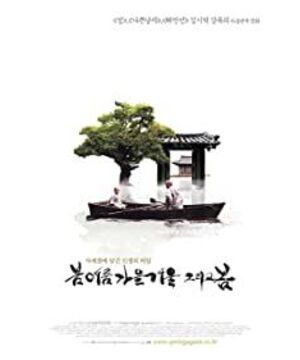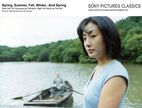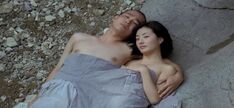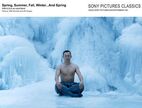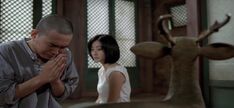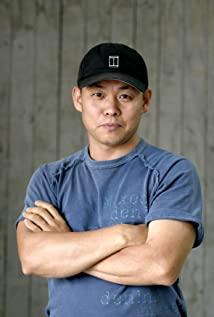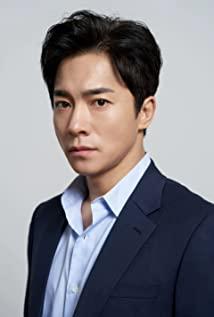One is detached from form. Director Jin doesn’t care how old the form is: it can be the most familiar beginning form "There was a mountain in the past, there was a temple in the mountain, there was an old monk and a little monk in the temple...", or it can be used extensively in the composition of elementary school students. The "Four Seasons" mode can be just two or three characters, it can be just in one scene, it can be extremely stingy dialogue from beginning to end (of course, this is a common feature of Golden Director movies), none of these matter, the important thing is the content , Is the content! !
He is very calm, the form is just a tool in his hand, but it is not that the form is not wonderful, the golden director who has a background in fine arts, I think no one will ignore the poetic and beautiful pictures in his movies. However, the content of the story is too rich. After more than two hours, my mind kept spinning like a clockwork. I just felt that my mind was not enough. At the end of the film, I still felt that it was still not enough. Just because of this short two hours, a reincarnation of life was extracted. In spring, summer, autumn and winter, we have experienced the journey of the little monk's life. Life is prosperous, and there are too many things that can be expressed, but the Golden Guide adopts a method of reducing complexity, and he has been soberly grasping the main stem from beginning to end, only expressing the most human and deepest things, those branches and branches. The vines are attached to the beauty, strung together a peculiar landscape. This movie is also prosperous. Prosperous as the four seasons.
Spring, weep for life. The little monk is very young, but a naughty child, swimming in the embrace of nature, bullying small animals, and living a carefree life. Like the childhood times that almost everyone will have. However, in this season when everything grows, one must complete a growth. This is the fear of life. So, when the spring was about to end, the little monk cried when he saw the dead animal.
Xia, the desire for love. Straightforward, these four words are puns: one is that the little monk is straightforward, and then he sees two mating together in the mountains; the other is that straight to the subject-in this amorous season, it is the time when desire is spreading. , The implication of two snakes entwined together couldn't be more obvious. Then the pitiful woman appeared, symbolizing a sexual desire. However, I prefer to understand it as a desire for love. We all have such ignorant times, like a ghost hitting a wall, like someone, obsessed and crazy about it, want to see him, be with him, then comes the desire to possess, chaos Mind, disturbing life, only ups and downs in the ocean of desire. It's messed up, but what can be done? Even the old monk said that this is "human nature". This is a compulsory course for everyone in their growth period, and everyone is the same.
Autumn, waiting for salvation. The little monk left and fell into the mortal dust. He was crazy about love. When he returned to the ancient temple in the deep mountains, he was already a fugitive murderer. How can it be liberated? He slapped and screamed in the water he used to go to, he put paper against his eyes and nose to make himself breathless, he hung himself up with a rope and tied himself with scars-all kinds of self-abuse methods, but to no avail. In the end, it gradually calmed down during the process of carving the scriptures. Movies use this metaphor-only religion can redeem, which is also a consistent claim in Kim Kidd's movies.
Winter, a grand transition. In a blink of an eye, when the door opened again, the little monk was already middle-aged. We can't know exactly what he has experienced over the years, but he seems to be quite familiar. He reverted to seclusion, strengthened his body, cultivated his character, and his former unruly and violent disappeared. We saw in him the same vicissitudes and calmness as the old monk back then. So circled around and returned to the hour. The director took a long time to show that he tied a big rock to himself, and then climbed hard to the top of the mountain. During the period, he kept switching to the scenes of the small animals tied to the rock, as if he was committing a crime. The wrong atonement is also deeply felt-life cannot bear the weight. Then at the end of winter, a baby appeared, suggesting a new beginning.
Another spring, when the baby grows up, he looks exactly like the little monk before, and repeats the same carefree time and mischievous behavior. Time reappears, another spring-another reincarnation of life.
About the old monk: In the film, the old monk always looks like a silent wise man, watching everything indifferently and taking it easy. I don't believe that anyone is born to see through the world, the old monk must have experienced the pain of growth, the torment of desire, the prosperity and vicissitudes of the world, maybe even more exciting than the young monk.
Regarding self-abuse: The characters in Kim Kidd’s movies often belong to the psychologically disadvantaged group, seeking relief in extreme ways in loneliness and despair. Kim Kidd explained the elements of violence he used in the movie like this: "I prefer to call it a form of body language. I prefer to understand it as a physical expression rather than a simple passive violence. My characters suffer. The injuries and burned scars are also experienced by young people at an age when they cannot really respond to external trauma. Because of all kinds of disappointments, they lose their faith and trust in others, so they no longer speak. . They turned to seek violence.” When I saw the little monk hanging up to seek relief after returning, I would remember that I used to scratch my arm with a knife in the dark-when the mental pain was too much to bear. I had to use physical pain to transfer. On this point, I don't want to say more. People who don't understand will think that you are moaning without illness, and people who understand will naturally understand.
Regarding talent: Jin Ji-de is undoubtedly talented, especially in the details of those whimsical ideas: the spring little monk tied fish, frogs and snakes to a stone, and the little monk was full of alternative ways when he was seeking liberation. The scriptures on the whole ground, the mysterious woman with her head wrapped in winter, and the young monk put stones in fish, frogs and snakes in another spring... These alternative details full of Zen make us have to admire Jin Ji De’s imagination. The expressive power with ease, as if all of them are affixed with a golden label-this family is exclusive and cannot be imitated. Although his films are still controversial in the world, everyone in the industry has to admit that he is really a genius!
View more about Spring, Summer, Fall, Winter... and Spring reviews


